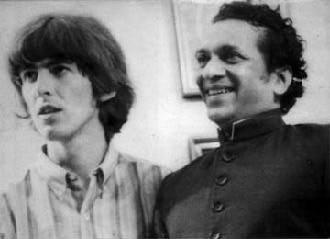New Delhi
08 April
Legendary musician Ravi Shankar, known for his pioneering work in taking Indian classical music to the West, turned 85 on April 7.
Few in Western countries had ever heard the Indian stringed instrument, called the sitar, before Ravi Shankar began playing in Europe and the United States in the 1950s and '60s.
It was a time when India was reasserting itself culturally following independence from British rule, and the West was open to influences from "the mystic East." Young Westerners were seeking new experiences, and the haunting and intricate melodies of Ravi Shankar's Hindustani style of music gave them what they wanted.
Deepak Raja, a well-known music writer in India, said Ravi Shankar soon rode a wave of popularity, successfully straddling the classical music worlds of both the East and the West. "He built bridges of understanding and cooperation with Western composers, with Western popular musicians, with modern composers and conductors," said Mr. Raja, "and that itself is an immense contribution to ensure that internationally the Hindustani music tradition was recognized as one of the world's great classical traditions."
 |
|
Beatle George Harrison and Ravi Shankar |
Ravi Shankar has always been an innovator. He wrote compositions using the violin and sitar, starting an era of fusion music. He made classical music more appealing to modern audiences and his influence on the Beatles led to them incorporating Indian elements into their songs.
Soon the sitar and other Indian instruments such as the tabla were familiar to many Western ears. In fact, some music critics say Ravi Shankar has done more for Indian classical music in the West than in his own country.
Others disagree, saying the sitarist helped bridge the vacuum that existed between the North Indian and South Indian classical traditions. They say his enduring contribution is to have moved classical music from the confines of a tiny elite to a wider audience.
K.V. Ramanathan, editor of the Indian dance and music magazine Sruti, says the musician's charisma played a vital role in the shift. "His competence, his popularity and if I may say so his personality attracted more people, got more people to listen to him, which meant more and more people got drawn into the sphere of appreciators of classical music," said the editor.
Ravi Shankar continues to perform in both East and West, and many say age has not dimmed the appeal of his music. "I am sure his music is as good as it used to be," noted Deepak Raja. "OK, it may not have the sparkling dexterity it had, but the soulful quality will never go."
Accolades have been heaped on him. George Harrison called him the "Godfather of World Music." He has received honors and awards from all over the world, including three Grammy awards in the United States.
But for many he simply remains India's greatest musical ambassador.
- This article first appeared on Voice of America on April 8, 2005.